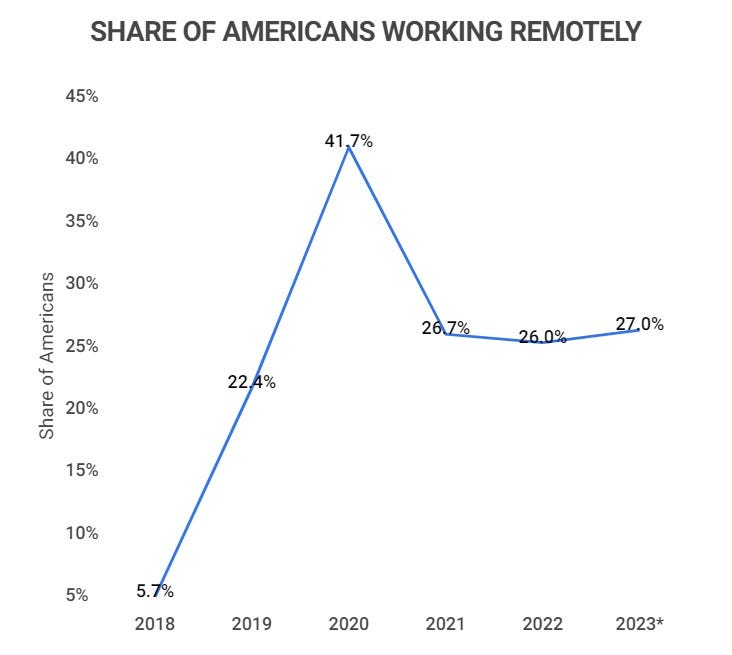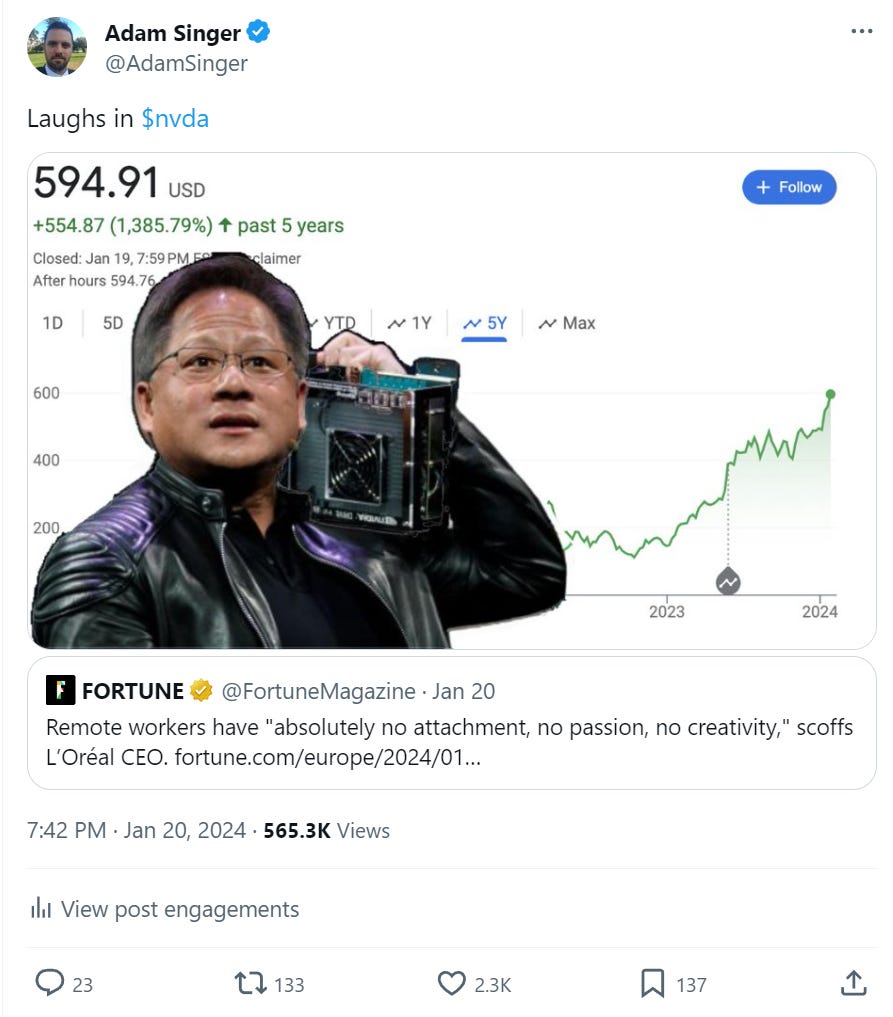Remote work won, don't let anyone gaslight you to believe otherwise
Bad managers and CRE bagholders lost, competent employees and internet-savvy teams won ...arbitrary authoritarian control over your work-life is so 1900s
I previously wrote what is still going to be my final post on remote work, at least the work part. In it, I went through the reasons why competent teams will be distributed for bits work, today and into the future (for atoms work we still need a human presence — for now). I’ve nothing really to add to that part of the conversation, remote work isn’t even new, people have been doing it since the 90s.
But in the time since I wrote the above post, remote work won and became a normal part of life for a large cohort of the population. This will only continue to grow, and so I wanted to comment a bit more on the topic as some are still strangely in denial.
Let’s start with this chart a friend shared with me on remote work quietly reaching equilibrium, which happened last year.
There is plenty other data, samples and trend sources here you can google, but broadly it is all pretty steady that over 1/4 of employees in the US are working remote in a durable fashion since 2020, and probably more interestingly 68% would prefer to be fully remote. Note it’s higher % of people working remote in cities because of the type of work done there.
Endless cubicle farms were never the end state of anything, and all this can be repurposed for better use: shopping, socialization, recreation, residential and exciting/novel concepts we’ve not even considered yet. The future here is something to look forward to: going to city centers purely to do something alone you can do anywhere makes no logical sense. This was all inevitable and good, unless you wanted humans to remain enslaved and great real estate locations to be stuck in 1950s-era industrial economy use.
Even the old guard suits at Goldman Sachs believe remote is here to stay [via Axios]:
Remote work appears likely to be the most persistent economic legacy of the pandemic," write Goldman Sachs economists in a recent note.
About 20%-25% of workers in the U.S. work from home at least part of the week, according to data Goldman cites. That's below a peak of 47% during the pandemic but well above its prior average of around 3%.
"The battle is over," said Diana Scott, human capital center leader at The Conference Board. "There are so many other issues CEOs are facing.”
Now that remote has been normalized for some time it was cool to also see some new research on public firms and distributed work just published December, 2023. The full paper is worth reading, but the summary is what you would expect if you’re paying attention and viewing this issue objectively (emphasis mine).
Using a sample of Standard and Poor’s 500 firms, we examine determinants and consequences of U.S. firms’ return-to-office (RTO) mandates. Results of our determinant analyses are consistent with managers using RTO mandates to reassert control over employees and blame employees as a scapegoat for bad firm performance.
…our findings do not support the argument that managers impose mandates because they believe RTO increases firm values. Further, our difference in differences tests report significant declines in employees’ job satisfactions mandates but no significant changes in financial performance or firm values after RTO mandates.
So basically, TL;DR: you will make your employees hate their lives, make less money and be less efficient by electing to assert authoritarian control over their movements and do the same work in a different arbitrary building every day. And I am not being hyperbolic here, I have heard stories from friends in legacy sectors whose teams have started location-tracking employees during the day. It’s straight out of a dystopian panopticon science fiction novel. I can’t imagine anyone competent staying at such firms very long.
Absolute top companies like like NVIDIA worth well >$1 trillion are running remote operations for their teams, so there’s really no excuse that “this is just for smaller shops.” My team at Google was distributed many years before this was normalized and we worked on software at internet scale. So when execs comment here, they’re simply putting their lack of (modern) management skills on display for the world to see. I Tweeted jokingly about this over the weekend here.
Really the only other dinosaurs howling into the wind about the latest fax machine going extinct due to the internet are CRE bagholders, who are of course upset they (god forbid) have to reinvest or change strategies, and continue to clutch pearls hoping the world would revert to a previous state. They of course don’t believe Earth can change (something it’s literally defined by). We’re a free capitalist society and so everyone has to go through the ringer of disruption, but ultimately we come out the other side better for the vast majority. They’ll evolve, but for some reason this group are extremely sore losers here.
There was this story last year in Minneapolis which was emblematic of so much I’ve seen in local markets, in which a CRE owner says "hey <company>, please put a gun to your employee's heads bc I want to make more money" …quite the take.
The irony of this quote is Randolph Street Realty Capital and Jonathan himself are based on Chicago, not Minneapolis. They aren’t even a local part of the community they claim to care about (they literally just care about their holdings, of course). They also flex aggregate asset value >600M on their website.
It’s incredible for a number of reasons, that there are grown adults who basically sound like children, but anyway if your income relies on political pressure for people to be forced to do something — sounds pretty un-American to me. This happened across America, and because of such public tantrums no one feels bad for them.
Where we go from here…
Daily commutes into an office are simply not coming back for competent people. Everyone I talk to who loves their craft would rather simply not work than go back to wasting their lives in traffic (and this is how we designed America). They would rather have that time purely for working, which they can now do. The analogy to best understand this which I’ve said before is like believing in Santa Claus as a child, and later discovering Santa isn’t real. You can’t go back. The spell of the office being a requisite for modern work was broken. The genie is impossible to put back in the bottle. Everyone will adapt.
So all we have left are bad bosses, CRE bagholders who want everyone to be miserable in order to prop up their portfolios, and some % of mid-managers who simply hate their lives and want their peers to sit in traffic for 2 hours a day (literally the cause of unhappiness in modernity). The world is pretty dark already, but I can’t imagine letting any of these groups claw-back an inevitable future the pandemic let us have early (basically the only positive outcome for our suffering here, if we didn’t keep it we’d have made it through all this for nothing).
There will of course be more nonsense: layoffs in the name of “RTO” using it as an excuse (which we know is a lie, and have research on linked above) and property owners who have no idea how the knowledge economy functions believing they get to dictate how corporate America works. Sane people will continue to point out the absurdity and hypocrisy. And for investors, employees or even just customers: remember any company doing “RTO” is a giant red flag they don't know what they're doing, are lying to the market, or hate their own employees. It’s really just layoffs by another name, because they can’t simply be honest.
In summary: remote work won, don’t let anyone gaslight you to believe otherwise.










Middle Managers want RTO to justify their jobs and be shown how to Print to PDF for the 200th time. Losing your best employees because the MM want to micromanage is a long term loser strategy. The winners will be flexible/nimble companies who can hire and retain the top performers and keep getting awesome results.
Somewhere a Boomer is pitching more pizza parties as an incentive to get people back into the office.
Spitting fire